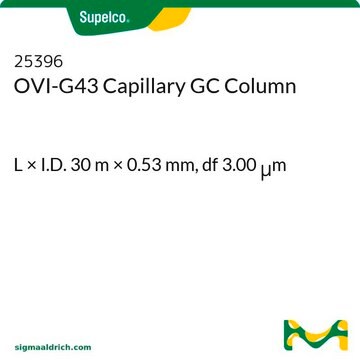24084
SUPELCOWAX 10 Capillary GC Column
L × I.D. 30 m × 0.32 mm, df 0.50 μm
About This Item
Recommended Products
material
fused silica
Agency
OSHA 52,80
meets requirements for USP G16
parameter
35-280 °C temperature (isothermal or programmed)
Beta value
160
df
0.50 μm
technique(s)
gas chromatography (GC): suitable
L × I.D.
30 m × 0.32 mm
matrix active group
Bonded; poly(ethylene glycol) phase
application(s)
agriculture
chemicals and industrial polymers
cleaning products
cosmetics
flavors and fragrances
food and beverages
industrial hygiene
personal care
petroleum
pharmaceutical (small molecule)
column type
capillary polar
Looking for similar products? Visit Product Comparison Guide
General description
USP Code: This column meets USP G16 requirements.
Phase:
- Bonded
- Poly(ethylene glycol)
- ≤0.32 mm I.D.: 35 °C to 280 °C (isothermal or programmed)
- ≥0.53 mm I.D., <2 μm: 35 °C to 280 °C (isothermal or programmed)
- ≥0.53 mm I.D., ≥2 μm: 35 °C to 250 °C (isothermal or programmed)
Application
Other Notes
Legal Information
Choose from one of the most recent versions:
Already Own This Product?
Find documentation for the products that you have recently purchased in the Document Library.
Customers Also Viewed
Our team of scientists has experience in all areas of research including Life Science, Material Science, Chemical Synthesis, Chromatography, Analytical and many others.
Contact Technical Service


